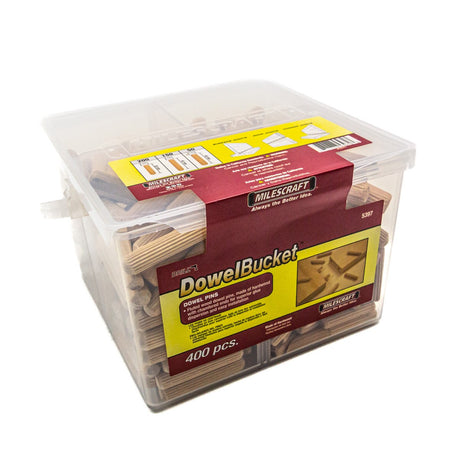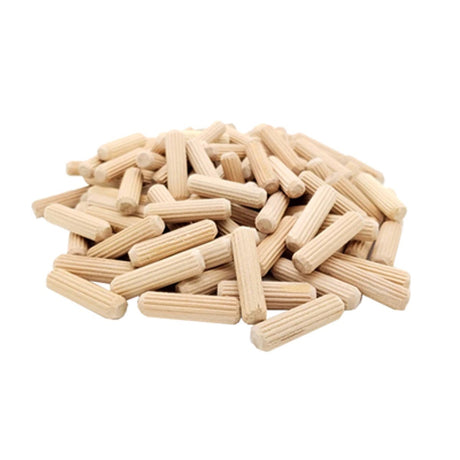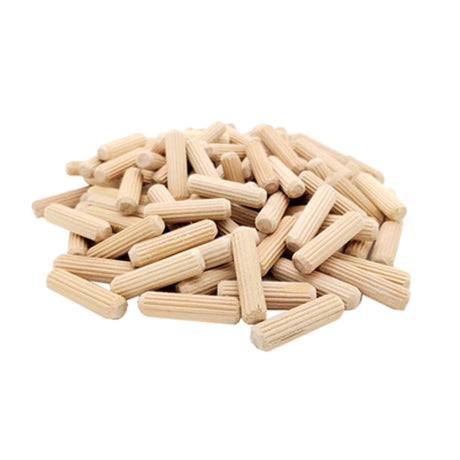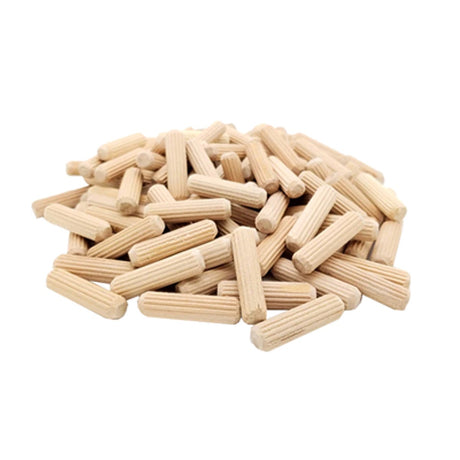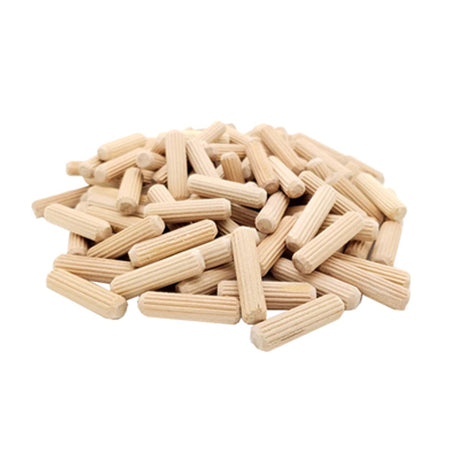Milescraft
Milescraft Dowel Joining Pins Variety Bucket of 400 Metric 6mm 8mm 10mm Fluted
$16.90$19.90Unit price /UnavailableIn stockMilescraft
Milescraft Wood Dowel Joiner Pins 10 x 40mm Pack of 30
$4.50Unit price /UnavailableLow stock (5 units)Milescraft
Milescraft Wood Dowel Joiner Pins 6 x 30mm Pack of 50
$4.50Unit price /UnavailableLow stock (3 units)Milescraft
Milescraft Wood Dowel Joiner Pins 10 x 40mm Pack of 1000
$59.90Unit price /UnavailableVery low stock (1 unit)Milescraft
Milescraft Wood Dowel Joiner Pins 8 x 40mm Pack of 1000
$49.90Unit price /UnavailableIn stockMilescraft
Milescraft Wood Dowel Joiner Pins 6 x 30mm Pack of 1000
$34.90Unit price /UnavailableIn stock
Reliable Alignment and Strength with Dowel Pins
Dowel pins are a key component in creating strong, accurate joinery in woodworking. These cylindrical pegs, typically made from hardwood timber, are inserted into pre-drilled holes to align and reinforce dowel joints. Whether you're constructing cabinets, frames, or furniture, using wood dowels ensures clean, fastener-free results that hold up over time.
Most dowel pins are fluted or grooved to allow glue to spread evenly, improving bond strength and reducing the risk of hydraulic pressure during assembly. Available in a range of standard diameters such as 6mm, 8mm, and 10mm, dowel pins are designed to pair perfectly with dowel jigs and dowelling jigs. Choosing the correct size and timber type, such as a hardwood dowel, helps maximise joint integrity and overall project durability.
Timber dowels can be used for edge-joining panels, assembling carcasses, or strengthening butt joints without visible screws or nails. To use dowel pins effectively, drill holes with matching depth and alignment using a dowel jig, apply wood glue to the pin and hole, and clamp the joint until fully set. For best results, always ensure tight tolerances between your dowel pin and drill bit.
FAQs
What are dowel pins used for in woodworking?
Dowel pins are used to align and strengthen joints by fitting into matching holes between two pieces of timber. They create hidden, flush connections ideal for furniture, cabinetry, and structural woodwork.
What’s the difference between a dowel pin and a regular wood dowel?
Dowel pins are typically precision-machined and often fluted, designed specifically for joinery. Standard wood dowels may come in longer lengths and are cut to size, while dowel pins are pre-cut and ready to use.
Should I use hardwood or softwood dowel pins?
Hardwood dowel pins, such as those made from beech or maple, are recommended for strength and durability. They resist compression and provide a tight grip inside the joint, making them suitable for both softwood and hardwood projects.
How do I match dowel pin size to my project?
Choose a dowel pin diameter that is roughly one-third the thickness of your timber. For example, use 8mm dowel pins for 19–25mm boards. Always use a matching drill bit for a snug fit and effective glue bond.
Are fluted dowel pins better than smooth ones?
Yes, fluted dowel pins are preferred because their grooves allow excess glue to escape and spread evenly. This reduces internal pressure and ensures a stronger, more reliable dowel joint.
Can I cut longer wood dowels into dowel pins?
Yes, you can cut longer timber dowels into pin lengths, but it’s important to keep cuts square and consistent. Pre-made dowel pins save time and are often more precise for critical joinery tasks.
Do I need a dowel jig to use dowel pins?
While not essential, a dowel jig or dowelling jig greatly improves accuracy when drilling holes for dowel pins. It ensures alignment and depth consistency, resulting in cleaner and stronger joints.
How far should dowel pins go into the timber?
Each dowel pin should be inserted halfway into each workpiece. For a 40mm dowel, that means drilling 20mm deep into each side. Use depth stops or marking tape on your drill bit to avoid over-drilling.



